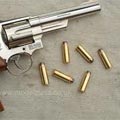If you want absolute certainty when in the outback, then a PLB is what you need.
If you want the ability to actually talk to someone and not just put out a distress beacon - then Satphone.
If you want a very good chance of being able to talk to someone from anywhere without having to pay for a satphone service, then happyhunter is on the money - HF. There are different bands that are more effective depending on the time of the day, etc.
For instance I'm normally guaranteed a hit somewhere in Australia if I'm using around 7,000hz range. (7khz)
Alternatively, many times I can bring up a New Zealand station if operating on 14khz (14,000hz) and it's not uncommon to be able to get Africa, Europe or America. (These are with a mobile whip on a car, but I've heard of people who have done it with hand held units as well).
I haven't played with CB frequencies that much. It's my limited understanding that once you get above a certain frequency that the chance for 'skip' becomes more dependent on atmospheric conditions and whether the 'band is open'. In vary rare situations it's possible to talk hundreds of km's on UHF as well with ducting.
Handheld UHF radio watts and range
21 posts
• Page 1 of 1
Re: Handheld UHF radio watts and range
happyhunter wrote:Khan wrote:So is there anyone official on the HF network, I mean, if you're in trouble is there guarantee you will be able to reach a rescue service or someone that can help?
Pointless if you're going to be reaching strangers that are almost certainly going to be too far away to help.
Other way around around mate. It's happened in the past where people were broken down out back of ****** ditch where UHF is dead and useless, and the people in trouble were able to contact a station in another state who in turn contacted the local police who contacted the police in the state where the folks were stranded.
I've done it many times, turned on the UHF when out remote and given a few calls and it's just dead. Turn on the old HF CB and it lights up with stations coming in from all over the joint.
I know the range limitations of UHF, that wasn't what I was referring to here.
You answered in a round about way maybe but just to clarify, there is no dedicated emergency responder access on HF? Correct?
You would be reaching other HF CB user civilians who you'd hope are in a position to help or who are in a location where they are able to contact emergency help and direct it to you?
I'm not knocking it, just wanting to understand.
44 Rem. Magnum Marlin Model 1894
.280 Rem. Browning X-Bolt Hunter
.280 Rem. Browning X-Bolt Hunter
-

Khan - Lance Corporal

- Posts: 181
- South Australia
Re: Handheld UHF radio watts and range
Khan wrote:You answered in a round about way maybe but just to clarify, there is no dedicated emergency responder access on HF? Correct?
It depends on the frequency. For instance, there are still dedicated HF channels used still today by modern airliners monitored by Air Traffic Control for communicating with air traffic for traffic that is in remote areas or across the sea. They change the frequency used depending on the time of the day (and/or success as to whether they can communicate).
I believe RFDS also still has dedicated emergency channels for outback communication - which may be more along the lines of what you are referring to.
But yes - there are also unofficial (sort of official) volunteer based network for HF nomads where they can 'check in' when traveling outback to report that they're arrived at their locations.
Short answer - Yes there are official commercial / government frequencies. Which ones you can use will depend on who you are trying to communicate with and whether your licensed to.
But still - just because stations are listening on these channels is no guarantee that you will be able to communicate with these channels. (There's also the question as to which frequencies you are authorised to use). But that aside - HF is no guarantee - it's not like the mobile phones, or short range UHF's that we're familiar with these days, but if you know and understand it, you will know what is most likely to be the better options depending on the time of day, distance required, etc.
- doc
- Lance Corporal

- Posts: 200
- -
21 posts
• Page 1 of 1

